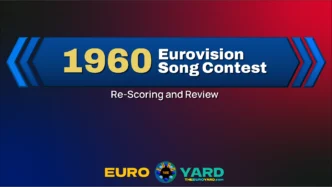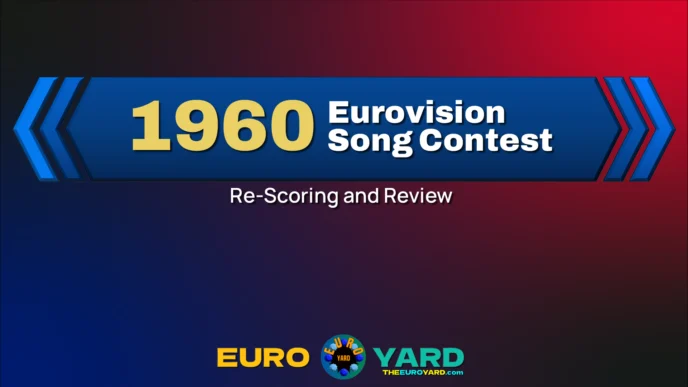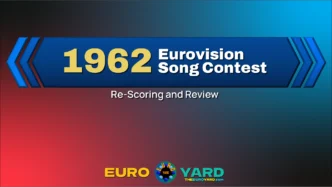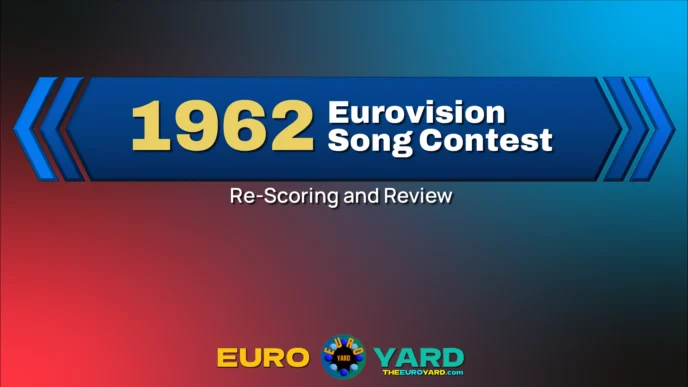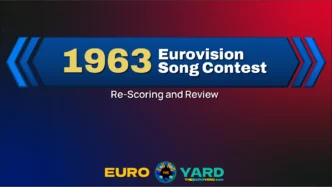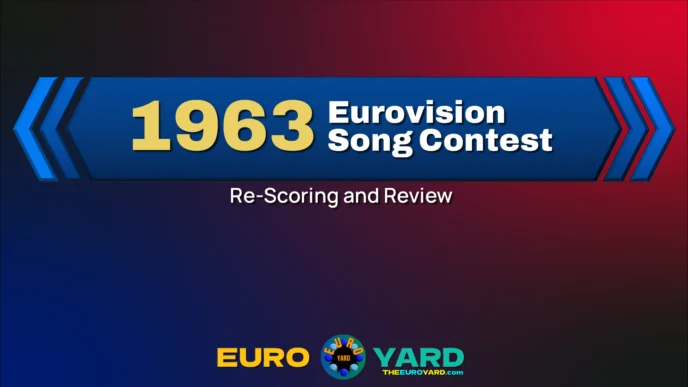Moving on with our next set of re-rankings, we come to the last show of the 1950s: the Eurovision Song Contest 1959.
This was the first contest to be hosted in France, and it gave us our first country to win the contest a second time. When you consider this was only the fourth Eurovision Song Contest ever, that is not bad at all.
Here, we get into our rankings of all 11 contenders and let you know who we think should have won – and who should have been nowhere near it. It is not all the time that we disagree with the juries of this time period, but it happens often enough, and every now and then, the differences are stark.
PLEASE NOTE: As of March 2025, the rankings below are obsolete. To view the updated rankings for 1959, please visit this article.
Eurovision Song Contest 1959: Basic Info and Facts
This contest was hosted in Cannes, France. As mentioned earlier, this was France’s first time hosting the contest. Specifically, ESC 1959 was at the Palais des Festivals et des Congrès, which is most notable for being the original theater which hosted the Cannes Film Festival. The theater which hosted Eurovision was replaced in the early 1980s with a newer Palais.
The Netherlands became the first country in Eurovision history to win a second time. Corry Brokken won in 1957.
Monaco made its Eurovision debut in 1959.
The United Kingdom finished in second place in 1959, and as of 2024, they have done that particular thing 15 more times. No country has come close to as many silver medals at Eurovision.
Finishing Outside the Top Ten

Bringing up the rear this year was Monaco with their inaugural entry, Mon ami Pierrot, sung by Jacques Pills.
The song itself is kind of sweet, talking about his love for his friend who is getting run out of show-business. However, as we know from past Eurovision contests, just because a song is sweet does not mean it was good.
I was not a fan of the performance. With all due respect to M. Pills, I did not buy in and I was not engaged. We scored it relatively low on vocals and frankly, it was kind of dull. Don’t worry, Monaco: it gets better.
Eurovision Song Contest 1959: 10th through 6th Place
As a reminder, we score every contest using the 12, 10, 8-1 system and tally up the all-time scoreboard at the end.
10th Place
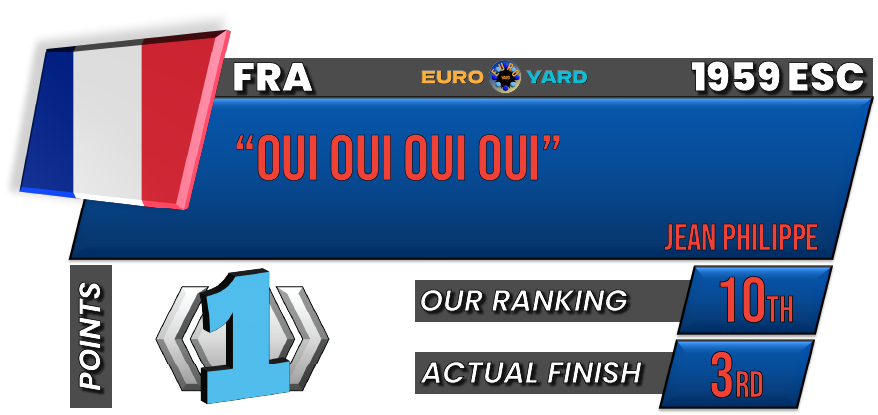
In 10th place on our list was France’s Oui oui oui oui by Jean Philippe.
This was one of those songs where I listened to it (on four separate occasions with four score sheets), did not like it any of those four times, and then look at the real-life scoreboard and see how close it came to winning. I could say I don’t understand the juries of this era, but in a way, I do. It was a different time, and standards of what we might consider quote-unquote good music were not necessarily the same 65 years ago.
The song, simply put, was irritating on several levels. Did the 1959 juries love it? Of course they did. It came in third place, and someone loved this song back in the day, but here in the 2020s, I do not. One thing I will give it is that lyrically, it was not bad, but I would not go out of my way to listen to it again.
9th Place
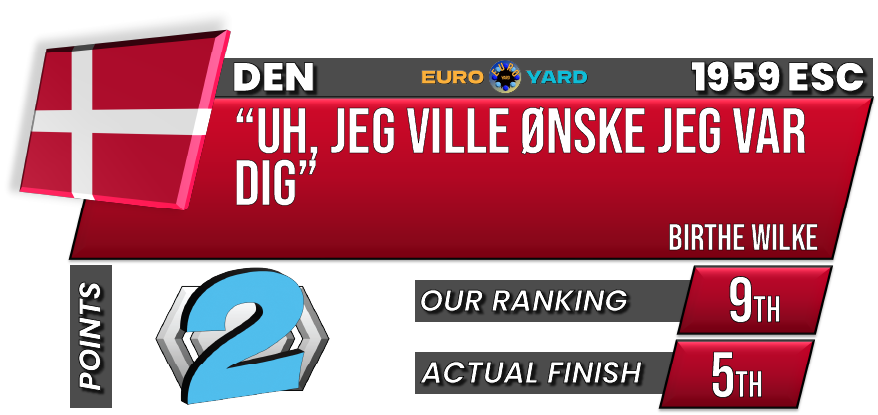
Ninth place (two points) goes to Denmark’s song Uh, jeg ville ønske, jeg var dig, performed by Birthe Wilke.
Wilke was part of the first duet in Eurovision history back in 1957, when she teamed up with Gustav Winckler in a song that we rated well. She returned two years later for a solo act, and I’m wishing she hadn’t dented her legacy in such a way. Again, the juries loved a song that I found annoying. I guess you just had to be there. A word that might apply to this song is “cloying.”
8th Place
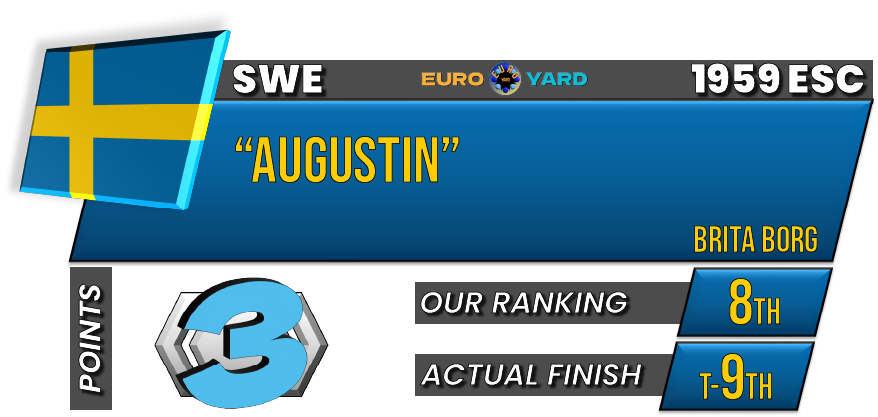
Up to eighth place, three points on the scoreboard, is Sweden with Brita Borg’s song Augustin.
We know today that Sweden is a Eurovision powerhouse. This was not the case back in the formative days of the Eurovision Song Contest, and certainly not in 1959. Borg finished ninth in real-time, and we had her in eighth. The song made very little impression and it registered average to slightly below-average scores in most categories. Maybe what had it above a few other songs was that the lyrics tell a real story – in this case, about a boy named Augustin who “never waits for a girl who’s in love.”
7th Place
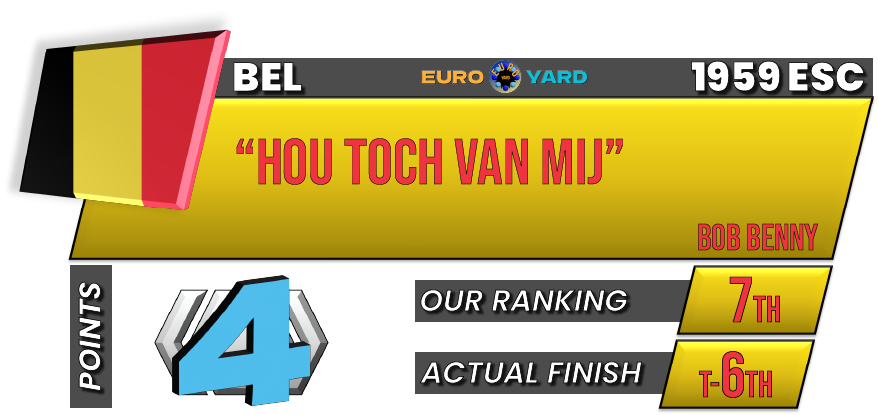
Moving up to Belgium in seventh place, we will find Bob Benny and his song Hou toch van mij.
The title translates from Dutch to “Do love me,” so it should be no surprise as to the subject nature of the song.
This one came across in a similar manner to Sweden’s entry before it, with the difference being that we had a little more gratitude for the vocal performance. He came in a little above-average in the vocal department, and lyrically, this song was not bad. However, it was one of the duller songs on the evening, so there was only so high it could go on our board.
6th Place
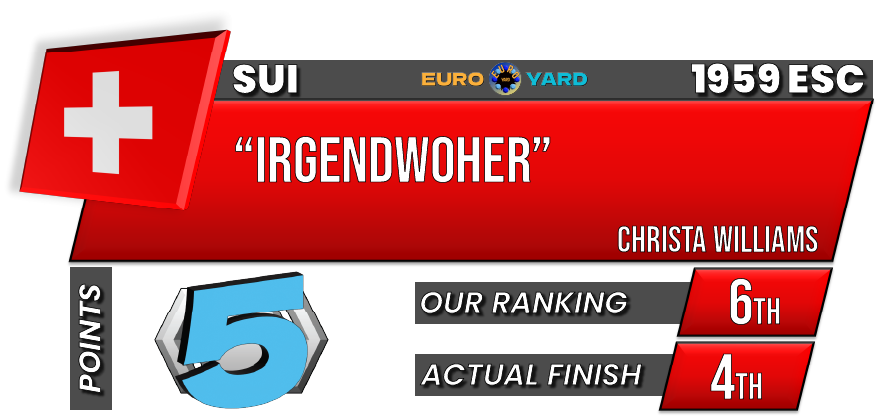
1959 was the first time Switzerland was not represented by someone named Lys Assia, and for Christa Williams’ efforts, we gave her sixth place for Irgendwoher.
Williams loved sitting on those high notes. Showing off some range got her a good score on vocals, and the song was at least average in terms of interesting and well-performed it was. Good enough to get it five points from us, though it felt like something was missing that did not elevate it to the top tier.
Eurovision Song Contest 1959: Top Five
5th Place
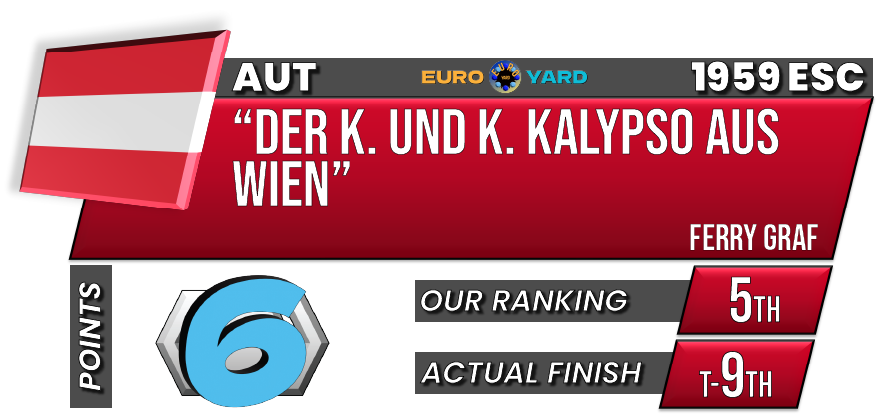
In what may come as a surprise to a few, we have Austria in 5th place (six points) with Ferry Graf’s song Der K. und K. Kalypso aus Wien.
I am not concerned if the Euro Yard takes heat, however minor, for putting this song in 5th place. For my theoretical money, it deserves to be there. Was it the best singing? No. Did it have the best lyrics? Doubtful. What Ferry Graf’s number did have, however, was originality. He went out there and did something completely different from everyone else, and it was not a bad performance. It was fun and unique. He even broke out the yodeling.
There was not a chance in Hell this kind of music would play with the juries in 1959, but he took a risk and I respect the hustle.
4th Place

Teddy Scholten may have won the Eurovision Song Contest 1959 for The Netherlands, but fourth place is where you will find Een beetje on our list; it earned seven points.
It’s not like this song was bad – fourth place is a respectable score on our card (and, in reality, it won the contest, so there had to be something likable about it). I just happened to think that a few other songs were better.
Scholten’s performance was well-done, I think most of us can agree on that. There were stronger vocal performances and songs that show off a bit more range. This seemed like a very cute, safe song that the juries would eat up, and they did. In many ways, it was the opposite of the Austrian song just before: Whereas that one took a risk and failed, this one took few, if any, risks and succeeded. However, she gets points for originality and lyrical quality.
3rd Place – Bronze Medal
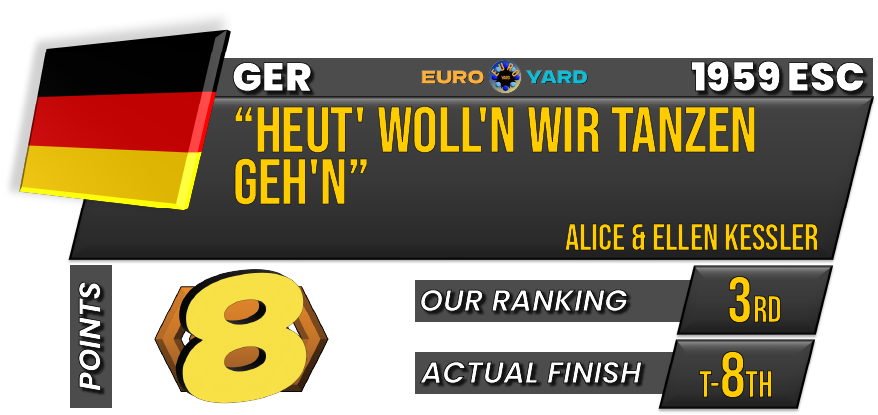
A fun German duet, Heut’ woll’n wir tanzen geh’n, has come in at third place on our list. It was performed by twin sisters Alice & Ellen Kessler. They may have finished eighth on the night of the contest, but we are giving them their flowers (as the kids these days say).
Above all, their performance was engaging, and not just because they choreographed a nice dance. Because of things that will happen at Eurovision almost five decades later, I am perhaps conditioned to enjoy a song any time someone shouts “tanzen!” Nevertheless, it was original, enjoyable, and it stood out for its charm, and they nailed it, regardless of what the juries said.
2nd Place – Silver Medal
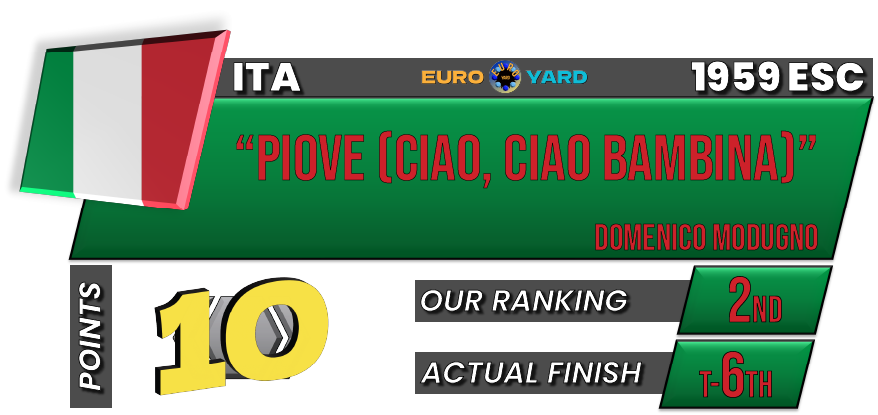
Our runner-up for 1959 was the same singer to whom we gave douze points in 1958, Domenico Modugno. His song in 1959, Piove (Ciao, Ciao Bambina) finished sixth in Cannes, but we have good reasons for handing it second place.
Let’s be clear: This was not as good of a song as Nel blu, dipinto di blu. Few songs are. However, even though I was a little less invested in the song itself (which was okay at best), his vocals were again scoring very highly across the board, which helped it shoot up the board. In fact, Domenico scored the highest vocals in this contest from us, just ahead of the song we have first. This was never going to come in first, but his singing talent got it where it landed.
1st Place – Gold Medal
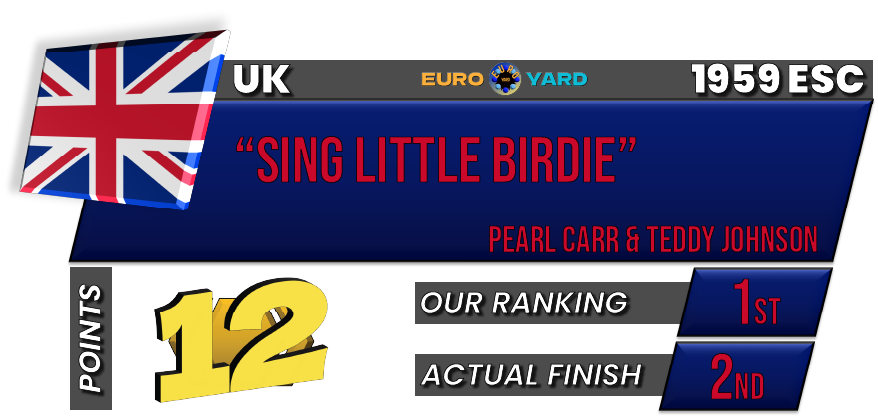
Did the wrong Teddy win Eurovision in 1959? We say yes.
Pearl Carr and Teddy Johnson went out there and took second place for the United Kingdom with Sing Little Birdie, but we would have given them first. Their number was energetic, well-sung, and interesting. They went all-in on that performance and this should have been the UK’s first win. A rule of mine is that whistling in a song typically loses it points, but in the case of Pearl and Teddy, it was just enough where it added to the depth of the song, but not too much that I became annoyed.
Sing Little Birdie is a song we hold in high esteem, both relative to other entries in 1959 and on our all-time list.
Euro Yard All-Time Scoreboard Through Eurovision Song Contest 1959
Clicking on the below image will enlarge it.
Next up, we make it into the 1960s with ESC 1960, which will be held in the United Kingdom.



